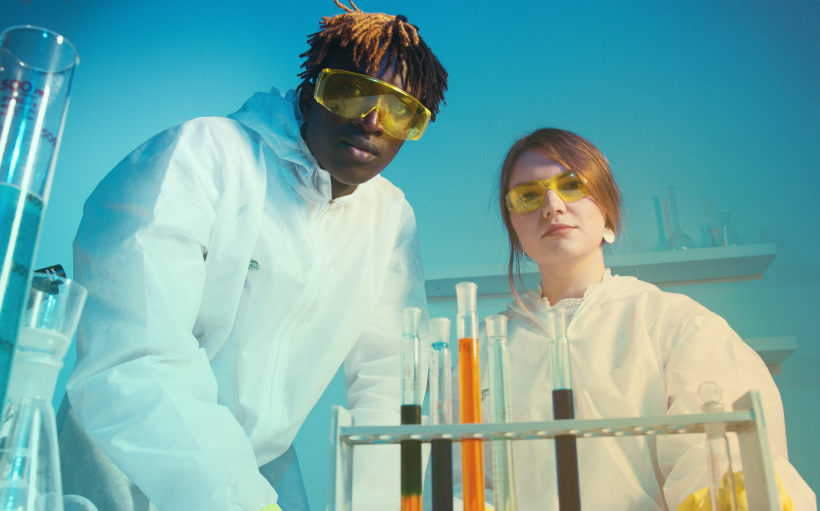I’ve always been inspired by women who are outgoing, very sure of themselves, and not afraid to be who they were, including their sex lives. Under their tutelage, I gradually shed my old self, hung out and socialized with them, and, over time, became the empowered, self-confident, and sexual woman I am today. Happy to share my insights with other women today!
Understanding Relationship Chemistry: How to Make the Sparkle Last?
Most of us had a chemistry class in high school. Memorizing all those elements and working out the formulas may not have been much fun. But doing those experiments and watching the chemical reactions was sometimes fun at least. And what about chemistry relationship may have? Can it also be that fun to watch and experiment?
What Is Chemistry in a Relationship?
Chemistry in relationships mostly has to do with “feel good” hormones that our brain releases in response to something that we find amazing and wonderful.
When thinking of chemistry feelings, the initial spark and physical chemistry on honeymoon usually come to mind first. We associate chemistry with the moment we first meet up and feel an immediate attraction: those flushing cheeks and the racing heart with their touch.
And when we start dating, this initial chemistry turns into sexual chemistry. That’s where all the confusion comes – with a lot of relationship chemistry being sexual chemistry lust, not love.
Related reading: Are You in Love or Lust? Here’s Your Answer
Relationship Chemistry: Fantasy vs. Reality
It’s not our fault: we’re conditioned to think chemistry is the foundation of “happily ever after” as every romcom movie and TV show told us that since we were kids. All those stories when boy meets girl, boy and girl fall in love, meet a challenge or two, and “ride off into the sunset together” as a perfect couple… All these stories have shaped our expectations.
But in real life, the chemistry-based form of courtship and “foreverness” is pretty much fantasy. And the more experience you have with dating relationships, the better you understand this.
For a romantic relationship to last, other aspects of good chemistry must develop. And these are not overnight deals. A healthy relationship can become a long-term relationship if that is the partners’ goal, meaning that they impose hard work into building great chemistry in other areas of their relationship. It calls for dedication and discipline, not sharpness and intensity of their emotions.
And that’s what this article is all about – it will explain the types of chemistry in a relationship that keep it on track and successful. You’ll find content accurate enough and backed by research that will help you decide if this person you’re with is really right for you.

7 Types of Lasting Relationship Chemistry
Disclaimer: In this overview, we go away from common perception of chemistry as physical and sexual attraction. We rather present it as connections that you established by taking those “feel good” hormones as triggers and foundation for your bond.
According to Kelly Campbell, Ph.D. and psychology professor at California State University, romantic chemistry is the sum of a number of characteristics between two people, and the more these characteristics are present in a romantic relationship, the greater the chance that it will be successful. Given this broader perspective of chemistry in a relationship, let’s take a look at what some of these factors of good chemistry really are.
Chemistry-Connection #1 – Intimacy
“When intimacy is present, people feel like they can talk to one another about anything, that they can trust their partner, and that their partner is a sincere and down-to-earth person…”
So, let’s take the sex out of it. What is intimacy in other terms? Actually, it’s an emotional connection that two people have. It involves the feeling of comfort and safety to be yourself around each other and full support in any circumstances. With time, such emotional intimacy becomes much more important in a couple than sexual desire.
But that doesn’t mean that non-sexual intimacy has no physical overtones. In reality, couples with a strong emotional connection use body language to exhibit their connection – handholding, arms around each other, dancing, etc. And this is how sexual chemistry manages to grow into intimate relationship chemistry.
Related reading: Understanding Physical Touch Love Language
Chemistry-Connection #2 – Trust
Both partners in a relationship can experience greater romantic chemistry when they can talk about anything easily and freely and have mutual respect for one another’s opinions without judgment or criticism. This freedom comes with mutual trust.
Likewise, trust in a successful relationship means that both understand each other’s red lines and believe wholeheartedly that the other would never cross them. Because mutual freedom should have mutually healthy boundaries.
Related reading: Boundaries in Relationships – Keeping Them Healthy
Chemistry-Connection #3 – Attentiveness
The short definition of a partner’s attentiveness is being attuned to the other’s needs and wants and responding positively to those.
The attentiveness piece of romantic chemistry is often overlooked. Yet, some peer-reviewed studies and high-quality sources point to how responsiveness deepens the connection between two people and leads to good chemistry in other areas of their romantic chemistry. So, if you have an interest in some academic research on the matter, have at it.
Do you know your partner’s love language? There are five of them actually, and physical touch, which we usually identify as chemistry, is only one. Others include acts of service, quality time, receiving gifts, and words of affirmation. Do a little research and have some conversation with your partner so you develop an understanding of their primary love language and respond by showing your love in that way.
Related reading: Words of Affirmation – How to Make Them Into Love Language?
Quality Time – It’s a Love Language
The Love Language of Gift Giving
Putting Love into Action – It’s a Language
Chemistry-Connection #4 – Friendship
Friendship relationship chemistry is the most common basis of a successful long-term relationship. Think about it. You have had close friends throughout your lifetime, and those with “staying power” are the ones you have built a lasting relationship with over time:
- You have open lines of communication with each other
- You share ideas and feelings
- You can count on each other in times of need or when dealing with an intense crisis
- You just have a sense of comfort in knowing they are always there when you need emotional support.
The same goes for you to build chemistry with a romantic partner. If couples are not also becoming very close friends, the chances of their relationships becoming long-lasting are just not there.
Chemistry-Connection #5 – Shared Interests, Goals, and Values
These combined are critical parts of solid personal relationships. And sometimes, they come with emotional intensity too. Let’s take a look at each of these three factors.
Shared Interests
You need to share similar ideas and interests to hold close and enjoy spending time with people. On the other hand, you tend not to feel chemistry with those whose interests are wholly different than yours.
Notice the word “wholly.” Because yes, you can feel chemistry with those whose ideas and interests vary from yours, just in less important ways. Nevertheless, good relationships depend on two people sharing an interest in some things. It brings them closer together when they pursue an interest or two together.
Suppose you have an abiding interest in preventing animal cruelty and volunteer in those efforts. A partner is abiding in restoring old cars and spends much free time in that activity. Is this a deal breaker? Of course not. It just pushes you both to make a compromise – or not.
Shared Goals
It’s unlikely you share the same exact goals, but they should be pretty similar for the relationship chemistry to work.
One person may want to pursue a master’s degree, while their partner aims to start their own business. The lack of similarity in these goals is not a deal breaker. Two individuals can certainly have different personal goals and still have the type of chemistry that comes with shared goals in important areas of their lives and futures.
Do these two people have a shared purpose related to marriage and a family? Do they have similar goals related to finances and saving for the future? These are the kinds of shared goals that matter and promote relationship chemistry. The two individuals have the same goals that matter. And yet they respect their partner’s individual and personal goals – a pretty good balance.
Related reading: Do Opposites Attract? It’s Not That Simple
Shared Values
Here is where the proverbial “rubber meets the road.” Two people who expect to have chemistry over the long haul had better have shared values.
And what are these? These are the morals and beliefs by which a person lives their life. These can include strict religious beliefs, of course, but there are secular values that almost every person has – things such as honesty, integrity, moral beliefs, trustworthiness, etc. These are standards that a person lives by. If yours are not similar to someone you are partnered with, you eventually will have lost chemistry you began with.
While differences won’t show up on the first date, if you have a strong sense that you are not a match in these areas early on, it is better to cut your losses and move on. You deserve a life with someone with whom you share important similarities.
Chemistry-Connection #6 – Treatment of Others
This aspect of chemistry relates to values, but it deserves a category of its own. How personable is your partner? How do they treat others? Do they exhibit consideration, kindness, and empathy to others of all stations in life? It’s tough for a romance to spark and chemistry to last if you have a partner who doesn’t treat others well.
Chemistry-Connection #7 – Physical Attraction
That first spark of a possible romance happens very early and is largely physical. It can begin with something as simple as eye contact, even prolonged eye contact, as the two of you are exploring a possible connection. That eye contact will progress to conversation and physical touch, and both of you a getting the idea that this could lead to something more.
Then comes physical desire and the prospect of sex, and that may turn out to be amazing. This person is definitely someone you want to spend time with on a regular basis. And you hope this may be the one for life. The physical desire continues through the early weeks of your relationship, and the chemistry continues or perhaps continues to bubble up, possibly to an unhealthy extent.
Romantic partners who think that physical attraction will carry them through and lead to everlasting bliss are only fooling themselves. Remember that only have in the movies.
Related reading: Is Love at First Sight Real?
A Final Word
Barbie is not a real person; Ken is not a real person. In fantasy, they live an idyllic life – they are permanently beautiful and happy and will be together in a perfect relationship. And it doesn’t take a team of social workers to explain how ridiculous this fantasy is.
You date in the real world. And you are perhaps looking for the one partner to build a life with. Before you get in too deep with all of that physical/sexual chemistry stuff, take some time and make sure that you can check off the other boxes of relationship chemistry.








